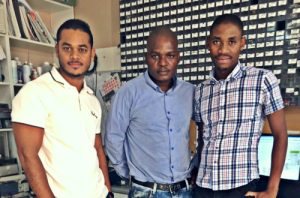
There is a perception that technology is only meant for the rich, says young South African entrepreneur, Fazil Ogle.
This is one of the stereotypes that Ogle, together with his partners Fortune Ngubane and Thabang Kekana, are hoping to shatter with the idea to launch their own home automation system designed specifically for the township market.
Ogle is the founder and managing director of electronics company, Ops360 that provides LED lighting and solar solutions for the mid to low end domestic and commercial market. Ngubane and Kekana co-founded Mukoni Technical Services, they focus on service and repairs to mining equipment such as control panels, PLCs (programmable logic controller) and motors.
All qualified electrical engineers, the trio came together and created, FFT Electrical, a newly established tech startup that offers bespoke solutions for electronic design and home automation. They designed and built their demo home automation systems in-house in Olievenhoutbosch, a township in Centurion in Gauteng.
“Together with my partners, we came up with the idea to introduce a low-end home automation system for the masses. We are targeting young, upwardly-mobile township residents across the country,” Ogle says.
Still in the pre-launch stage, the entrepreneurs are currently doing demos around their neighbourhood as well as in other townships such as Tembisa and Diepsloot.
This involves installing the devises in the homes of carefully selected key individuals within the townships including councilors, business people and popular establishments.
“We will be launching a basic, entry-level model, that retails at approximately R1 000 early in the new year,” Ogle says. This model, he says, is a six-button pocket remote you can use to switch the lights on and off, as well as other appliances such as your geyser from as far as 200 meters away. An app-based, higher-level model is planned for around mid-year 2017.
They are also hoping to leverage their industry networks to help establish their brand. They have partnered with architectural firm, MVM Architects with the aim of having their devices included in the firm’s designs for houses and complexes.
What is home automation?
Ogle explains that home automation is a way of controlling all the electronics in your house remotely or using a remote.
“So, you can be at work and you can switch the stove on, you can be on holiday and if you go on an app it’ll tell you that the bedroom light is on and you can switch the light off from your phone. That’s a high-end home automation system, it’s very expensive. They can go for as much as R800 000 for one house.”
Home automation systems can range from the simple smart plug that provide better control over the appliances and devices plugged into the wall outlets, smart lighting systems to smart sensors that include motion sensors, temperature sensors, humidity sensors and weight sensors.
According to market research firm Markets and Markets, the global home automation system market is expected to reach US$78.27 billion by 2022. In South Africa revenue in the home automation segment was predicted to amount to US$5 million in 2016, according to statistics portal, Statista.
SME South Africa speaks with Ogle about their idea to bring home automation into the township and the potential for essentially creating their own market.
“We asked ourselves ‘what do people in townships want’?”
I met up with Fortune by chance through mutual friends and I realised that we had the same vision for changing the country. And through our conversations and what I’ve seen from traveling around the world, home automation is a known industry around the world but once again, it’s for a few rich people, people who have the 10 bedroom houses. We [decided to] localise our solution and we’re making it suit the township.
We asked ourselves ‘what do people in townships want’? They want everything but often can’t afford it. The things they spend money on tends to be for status and it’s for perception. If you dress well, you drive a GTI with big sound and you have the latest phone, people are drawn to you. It is perceived that you have power and success. Using that perception I said ‘why don’t we design something low-end’ that they could still appreciate.
“We have an opportunity to define and create the market – show people that this is not what you want, this is what you need”
We then designed our first basic model. You’re about to enter into your house, you switch your lights on using the remote. The remote can also tell you which rooms the lights are still on and you can switch them off without leaving your couch.
The product offers convenience, from a psychological perspective it actually looks pretty good but more than that it can save you money by helping you cut down on your electricity bill as well as helping you live a greener lifestyle.
“The township market is growing because people want to stay in townships”
People have this illusion that technology and success is for white people or suburban people. And it makes people living in townships despondent, it makes them not motivated, and this is one of the reasons we chose the township market.
A lot of what I do, a lot of the decisions that I make, it’s calculated. I’m not the kind of guy that is driven by my gut feel. The numbers need to tell me this is right. So going into township is for a few reasons, most people in the country [are black], and from that population the largest percentage are in townships and from that concentration of people there are so many educated (and non-educated) smart, driven people there.
Secondly, the township market is growing because people want to stay in townships, so why move out when everyone is starting to move in?
Thirdly, we also want to create awareness of what really exists, especially in technology. So that is what we’re doing – bringing opportunity, bringing technology and we’re trying to grow the township by hiring people, building in the township which I personally believe that to get this country right we’ve got to focus on the township economy. That’s where the future is, that’s where the opportunities are. Presidents and future leaders of the country are going to come from the townships. And if we can get our name there, we can develop people there, we can create purpose in the township.
FFC also provides bursaries for young people in the townships to study and then offering them internship opportunities and the chance to develop their technology skills.
“We have an opportunity to define and create the market”
I believe that we are the ones [who will get] to decide how big the market is going to be. Ten years ago when everyone was walking around with Nokia 3310s, Steve Jobs said he wanted to put a dent in the world. Who would have thought that one day we would be walking around with a tablet where you can read the news, you can play games, you can look at the internet and read your e-mails from your phone or from a tablet?
In a similar fashion we want to create that market. Now the home automation market in South Africa is very high-end, very exclusive small niche.
We have an opportunity to define and create the market – show people that this is not what you want this is what you need. You need to be electricity conscious. We also considered the safety aspect. If someone is in your house trying to break in, there’s only two ways the person is going to get out, when he’s stolen everything or when he thinks he’s going to get caught. So if you are in your house and you switch the lights on, he’ll want to getaway.
“Marketing is very important”
Our biggest challenge is convincing people why our product is going to change lives. It’s difficult for now because people don’t know that they need it. That’s a challenge, so marketing is very important. One of the things we are focusing on is using influencers to introduce the product and spread the word.
For now we are doing it old school (marketing method) so no website for now. We have started doing demos within townships such as Tembisa and Diepsloot as a start. We are not going to consider retailers for now until we have conquered the township confidence in the product and service.


